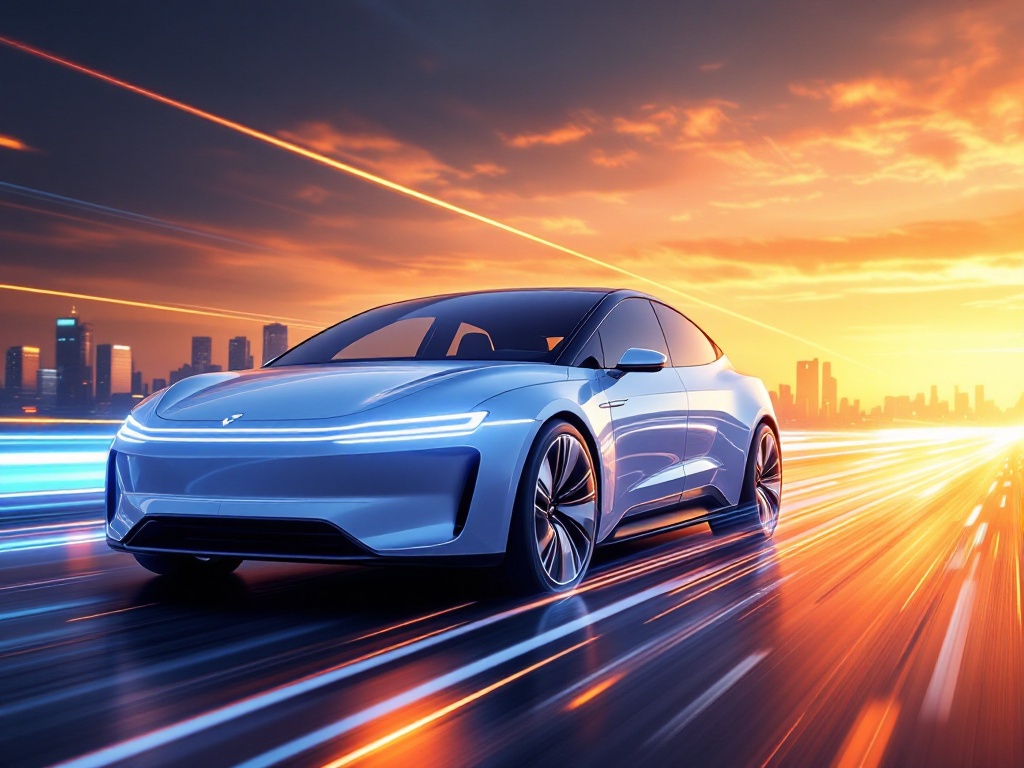Introduction: Buckle Up for the EV Revolution
Ladies and gentlemen, start your engines—or rather, charge your batteries—because we’re about to embark on an electrifying journey through the future of the Electric Vehicle (EV) industry. It’s a ride full of innovation, technology, and, yes, a bit of humor to keep things lively. From Tesla to toaster-sized charging stations, let’s explore how the future of EVs is shaping up to be a thrilling adventure.
The Rise of the EV: Not Just a Passing Trend
First, let’s address the elephant in the room: is the EV industry a fad or a revolutionary wave? Spoiler alert: it’s the latter. With global concerns about climate change and the need for sustainable transportation solutions, EVs have become more than just a buzzword; they’re the star of the automotive show.
- Growing Pains and Gains: Like any superstar, the EV industry has had its share of growing pains. Remember when EVs were about as cool as flip phones? Well, the times have changed. Thanks to technological advances and environmental policies, EVs have become the new cool kid on the block.
- Policy Power: Governments around the world are waving their magic policy wands, casting spells to boost the EV industry. With incentives like tax breaks, rebates, and infrastructure development, they’re creating a more favorable environment for EV adoption.
- Consumer Demand: And let’s not forget the consumers. People are clamoring for cleaner, greener options. Whether it’s the appeal of silent drives or the desire to reduce their carbon footprint, consumers are demanding more EV choices.
Charging Ahead: The Evolution of Battery Technology
Let’s talk batteries—the heart of every EV. The evolution of battery technology is akin to a superhero origin story, with each development bringing us closer to a future where range anxiety is a thing of the past.
- Supercharged Solutions: Gone are the days when your EV ran out of juice faster than your smartphone. Today, companies are investing heavily in research to develop longer-lasting, faster-charging batteries. Solid-state batteries, anyone?
- The Range Race: Automakers are in a fierce competition to extend the range of their EVs. It’s the automotive equivalent of a marathon, and every mile counts. With each innovation, drivers can travel further on a single charge, opening up new possibilities for long-distance EV travel.
- Eco-Friendly Materials: In the quest for better batteries, sustainability is key. Researchers are exploring alternative materials and recycling methods to make batteries more eco-friendly. After all, what’s the point of a green car if its battery isn’t green?
Infrastructure: Building the Road to Success
If EVs are the future, then charging infrastructure is the roadmap. Without a robust network of charging stations, the EV revolution would be stuck in neutral.
- Charging Challenges: One of the biggest hurdles for EV adoption is the lack of charging stations. Fear not, as governments and private companies are stepping up to the plate, investing in infrastructure that will make charging as convenient as refueling at your local gas station.
- Speed of Light Charging: Fast-charging technology is advancing at warp speed. In the future, charging your EV could be as quick as grabbing a latte. Imagine that—a caffeine fix and a fully charged car in mere minutes!
- Home Sweet Home Charging: Home charging solutions are also evolving. With smart chargers and solar integration, homeowners can enjoy the convenience of charging their EVs while sipping coffee in their pajamas.
The Role of AI and Automation: Driving Innovation
Artificial Intelligence (AI) and automation are not just sci-fi fantasies; they’re transforming the EV industry in ways we could only dream of a decade ago.
- Autonomous Awe: Self-driving cars are no longer a concept of the future. They’re here, and they’re ready to take the wheel. With AI at the helm, EVs are becoming smarter, safer, and more efficient.
- Predictive Maintenance: Thanks to AI, EVs can now diagnose themselves. No more guessing games when that mysterious dashboard light comes on. Predictive maintenance ensures your EV is always in tip-top shape, giving you peace of mind on the road.
- AI in Manufacturing: AI isn’t just driving cars; it’s revolutionizing how they’re made. From optimizing production lines to ensuring quality control, AI is making the EV manufacturing process faster and more efficient.
The Global Impact: A Greener Tomorrow
The shift to EVs isn’t just an automotive revolution; it’s a global movement with far-reaching implications for our planet.
- Cleaner Air, Healthier Lives: EVs produce zero tailpipe emissions, contributing to cleaner air and healthier communities. Imagine a future where cities are free from smog and pollution, and where breathing easy is the norm.
- Sustainable Energy Synergy: EVs and renewable energy are a match made in heaven. As the grid shifts to more sustainable sources, EVs will play a crucial role in reducing our reliance on fossil fuels.
- Economic Opportunities: The transition to EVs is generating jobs and economic growth. From manufacturing to infrastructure development, the EV industry is creating a wealth of opportunities for businesses and workers alike.
The Role of Big Players: Tesla and Beyond
When it comes to the EV industry, it’s hard not to mention the big players making waves. Tesla may be the poster child, but they’re not alone in this race.
- Tesla’s Trailblazing: Tesla continues to lead the charge with its innovative designs and cutting-edge technology. From the Model S to the Cybertruck, Tesla’s lineup is a testament to the company’s commitment to pushing boundaries.
- Rising Stars: But Tesla isn’t the only game in town. Companies like Rivian, Lucid Motors, and traditional automakers like Ford and Volkswagen are stepping up their EV game, offering consumers more choices than ever before.
- Collaboration is Key: In the world of EVs, collaboration is the name of the game. Automakers, tech companies, and governments are joining forces to accelerate the industry’s growth and ensure a sustainable future.
Overcoming Challenges: Navigating the Roadblocks
The road to an electrified future isn’t without its obstacles. From supply chain issues to consumer skepticism, the EV industry must navigate a few bumps along the way.
- Supply Chain Struggles: The demand for EVs is skyrocketing, and with it comes supply chain challenges. From semiconductors to raw materials, the industry must find ways to overcome shortages and meet consumer demand.
- Consumer Concerns: Not everyone is sold on the idea of EVs. Range anxiety, charging infrastructure, and price are common concerns. The industry must address these issues to win over skeptics and boost adoption rates.
- Regulatory Hurdles: Navigating the regulatory landscape can be tricky. As governments implement new policies and standards, automakers must stay nimble and adapt to changing requirements.
The Future of EV Design: Sleek, Smart, and Sustainable
Design plays a crucial role in the EV industry’s success. As we move forward, expect to see vehicles that are not only efficient but also aesthetically pleasing and sustainable.
- Aesthetic Appeal: Gone are the days of boxy, uninspired EV designs. The future promises sleek, futuristic models that turn heads and make a statement on the road.
- Smart Interiors: The inside of an EV is just as important as the outside. With advances in technology, expect smart interiors that offer seamless connectivity, personalized experiences, and a touch of luxury.
- Sustainable Materials: Sustainability doesn’t stop at the powertrain. Automakers are exploring eco-friendly materials for interiors and exteriors, ensuring that every aspect of an EV aligns with green principles.
The Role of Startups: Innovators and Disruptors
Startups are the lifeblood of innovation, and the EV industry is no exception. These nimble companies are pushing boundaries and disrupting traditional norms.
- Innovative Solutions: Startups are developing innovative solutions to some of the industry’s biggest challenges. From wireless charging to autonomous delivery vehicles, they’re redefining what’s possible.
- Agility and Adaptability: Startups thrive on agility, allowing them to pivot quickly and adapt to changing market demands. This flexibility gives them a competitive edge in a rapidly evolving industry.
- Collaboration Opportunities: Startups often collaborate with established players, bringing fresh ideas and perspectives to the table. These partnerships can lead to groundbreaking advancements and mutual success.
Conclusion: Embracing the EV Future with a Smile
As we wrap up our journey through the future of the EV industry, it’s clear that the road ahead is full of promise and potential. With advances in technology, design, and sustainability, the EV revolution is poised to transform the way we think about transportation. So, buckle up, charge up, and get ready to embrace the electrifying future with a smile on your face. After all, the journey is just as exciting as the destination.
Slug: future-ev-industry-journey
Meta Description: Explore the future of the EV industry with a friendly and humorous look at innovations, challenges, and opportunities. Discover how EVs are shaping a sustainable future.

